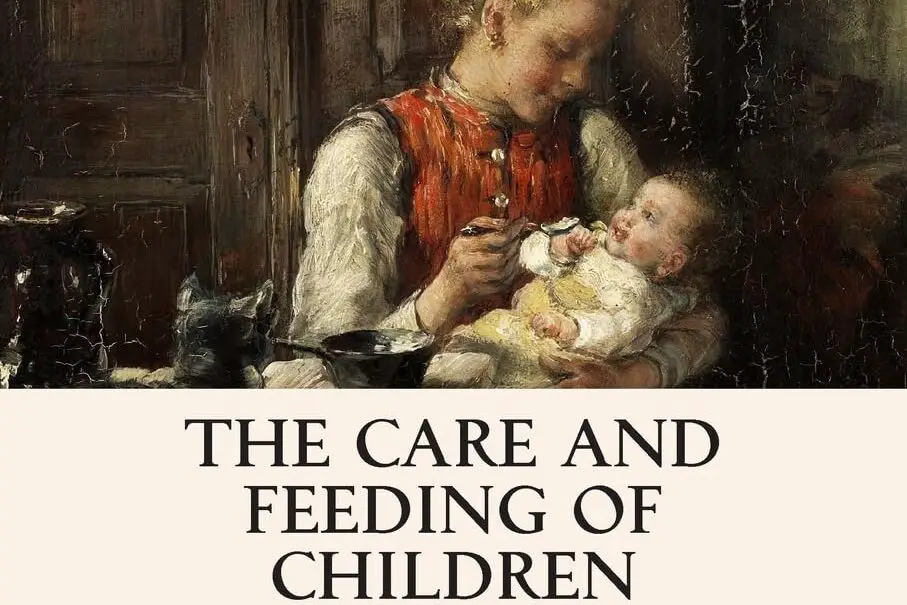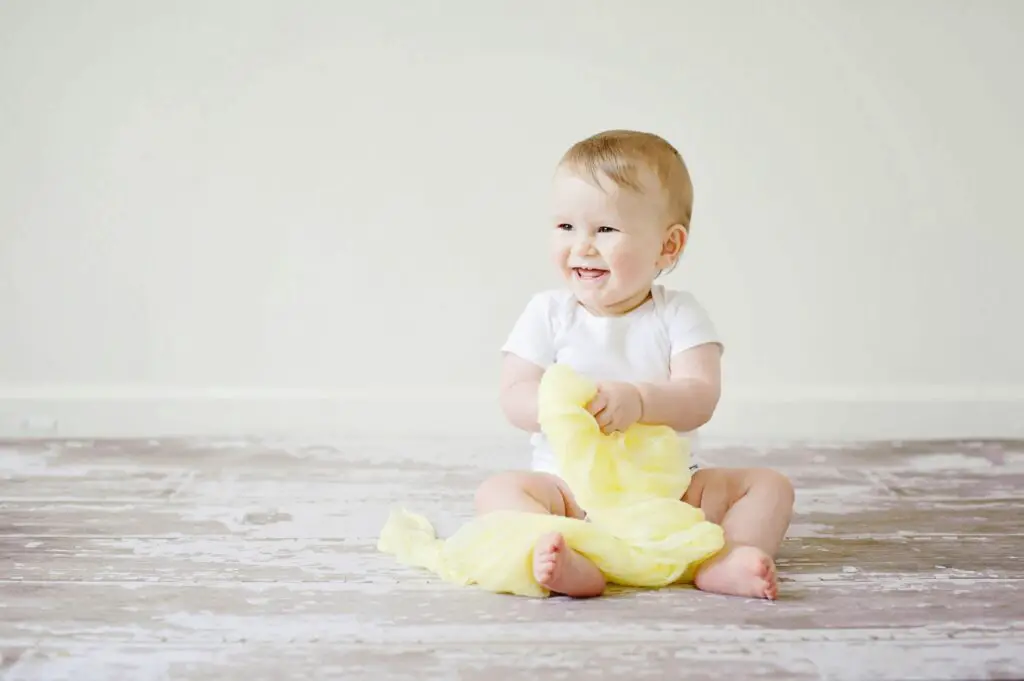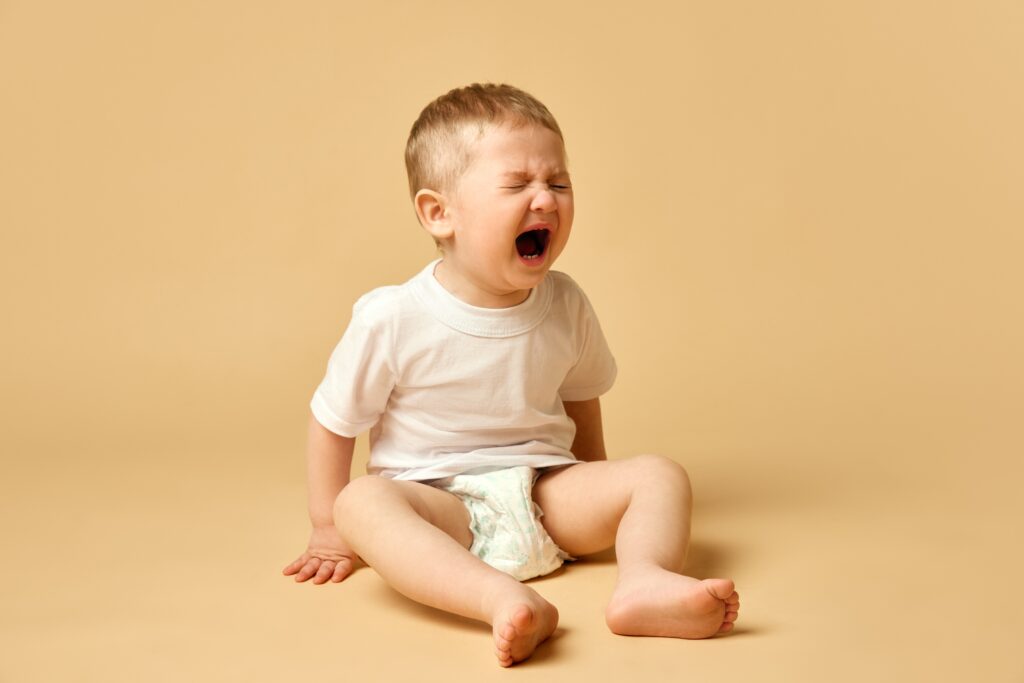1. The Care and Feeding of Children (1894)

Dr. L. Emmett Holt’s parenting manual was considered the go-to guide for raising children in the late 19th century, but his advice now sounds downright cruel. He advised parents not to pick up their babies too much, believing cuddling would make them weak and needy. He also recommended a strict feeding schedule, ignoring a baby’s hunger cues entirely. If that wasn’t bad enough, he believed in keeping nurseries cold and discouraging rocking babies to sleep says Slate.
Many parents followed his advice to the letter, but modern science completely debunks these ideas. We now know that responding to a baby’s cries helps them develop trust and security. Ignoring their hunger or discomfort can actually lead to long-term stress. If a pediatrician handed this book out today, parents would run the other way.
2. Psychological Care of Infant and Child (1928)

John B. Watson, one of the founders of behaviorism, had some of the most robotic parenting advice ever. He argued that parents should show as little affection as possible, warning that hugs and kisses could make children emotionally dependent. His ideal parent-child relationship was more like a business partnership—no cuddling, no rocking, and certainly no baby talk. He even went so far as to say mothers should never let children sit on their laps shares the Week.
Watson’s theories shaped parenting for decades, but the emotional damage they caused is now well-documented. Studies show that affection is critical for a child’s mental health, and withholding it can lead to serious psychological issues. Parenting today emphasizes attachment and bonding, the exact opposite of what Watson preached. His advice wouldn’t just be ignored today—it would be condemned explains the Atlantic.
3. Baby and Child Care (1946)

Dr. Benjamin Spock’s book was a massive bestseller, but some of his recommendations would be outright dangerous today. He advised parents to put babies to sleep on their stomachs, a practice now linked to Sudden Infant Death Syndrome (SIDS). He also suggested that parents trust their instincts rather than follow strict medical guidelines. While that advice sounds nice in theory, it led many parents to ignore emerging scientific research says Salon.com.
Spock later admitted he was wrong about the sleep position, but his book had already influenced generations of parents. His relaxed approach to discipline also received backlash, with critics blaming his teachings for creating an overly permissive culture. While some of his ideas about respecting children’s individuality were progressive, other advice simply didn’t hold up. If his book were rewritten today, it would come with a lot of disclaimers.
4. The Common Sense Book of Baby and Child Care (1946)

Dr. Spock wasn’t the only one dishing out advice in the ’40s, but his book had some real whoppers that didn’t age well. He encouraged parents to let babies cry it out, believing they needed to “learn independence” early. He also had some questionable diet recommendations, including suggesting that babies could drink orange juice before they were even a month old. At the time, people thought vitamin C was necessary for preventing scurvy, but now we know it can be too acidic for newborns.
While Spock’s overall message of trusting parents was well-intended, many of his health suggestions were outdated. His stance on discipline also waffled over time, leaving some parents confused. Today, we have much more research on child development, and many of his theories wouldn’t pass modern scrutiny. His book sold millions, but you’d be hard-pressed to find a pediatrician endorsing it now.
5. Dare to Discipline (1970)

Dr. James Dobson’s book was a favorite among strict, authoritarian parents, but it promoted some downright harmful techniques. He strongly advocated for spanking, arguing that it was the best way to instill obedience. He even suggested using a switch or a belt to discipline children, claiming that physical punishment would make them more respectful. His approach was rooted in religious beliefs, but it ignored the psychological effects of corporal punishment.
Today, studies overwhelmingly show that spanking does more harm than good, leading to increased aggression and emotional problems. Parenting experts now emphasize positive reinforcement and natural consequences instead of physical discipline. Dobson’s book might still have followers in certain circles, but mainstream parenting has moved far away from his harsh methods. If a new book promoted these ideas today, it would be met with outrage.
6. To Train Up a Child (1994)

Michael and Debi Pearl’s book is one of the most controversial parenting guides ever written. It promotes an extreme form of discipline, instructing parents to spank their children with plastic tubing for any misbehavior. The Pearls even suggest hitting infants as young as six months old to “train” them into obedience. The book compares child-rearing to animal training, encouraging parents to break their children’s wills.
Unsurprisingly, this book has been linked to multiple cases of child abuse, some even leading to tragic deaths. Child development experts have denounced its teachings, calling them abusive and dangerous. Many bookstores refuse to carry it, and parenting organizations have fought to have it banned. If this book were released today, it would cause an uproar.
7. The Discipline Book (1995)

Dr. William Sears is well-known for promoting attachment parenting, but his early work on discipline wasn’t always so gentle. In The Discipline Book, he recommended a method called “baby training,” which involved ignoring a crying baby for extended periods. He believed this would teach them self-soothing skills, but modern research suggests otherwise. Ignoring a baby’s cries can actually increase their stress levels and impact their emotional development.
Sears later softened his stance, but his book misled many parents. The idea that babies should be independent at an early age contradicts everything we now know about infant bonding. Parents today are encouraged to respond to their child’s needs rather than train them into silence. While some of Sears’ ideas were ahead of their time, this particular book didn’t age well.
8. Raising Boys (1997)

Steve Biddulph’s Raising Boys became popular in the ’90s, but some of its gender-based parenting advice feels outdated. The book heavily emphasizes traditional masculinity, suggesting that boys need to be toughened up through rough play and discipline. It warns against raising “soft” boys, implying that sensitivity is a weakness. Biddulph also claimed that boys develop differently from girls in a way that requires an almost militaristic approach to parenting.
Modern research has shown that boys benefit from emotional nurturing just as much as girls do. The rigid gender roles promoted in this book have been widely challenged, with experts advocating for a more balanced approach. Parents today are encouraged to embrace their child’s individuality rather than forcing outdated ideals onto them. If this book were written now, it would need a major rewrite.
9. On Becoming Babywise (1995)

Gary Ezzo’s parenting book promised to teach parents how to get their babies to sleep through the night, but his methods were harsh. He promoted a strict feeding and sleeping schedule, discouraging parents from feeding their babies on demand. His rigid approach led to cases of dehydration and failure to thrive, as babies weren’t getting enough nourishment. Pediatricians have repeatedly warned against the methods in this book.
Many parents who followed Babywise reported serious problems, including sleep issues and attachment struggles. The American Academy of Pediatrics has even issued warnings about its dangers. Parenting experts now recommend a more flexible, responsive approach to infant care. If a new book promoted Ezzo’s methods today, it would be immediately criticized.
10. The Strong-Willed Child (1978)

Another book from Dr. James Dobson, The Strong-Willed Child encouraged parents to break a child’s defiant spirit through strict discipline. He promoted spanking as the primary way to handle disobedience, even in very young children. Dobson claimed that physical punishment was necessary to maintain parental authority and prevent kids from becoming rebellious. His advice often leaned into fear-based parenting, suggesting that without firm discipline, children would grow up to be uncontrollable.
Today, child psychologists warn against the idea of “breaking” a child’s will. Studies show that harsh discipline can lead to long-term behavioral and emotional issues. Experts now advocate for guiding strong-willed children with patience and structure rather than punishment. If this book were published now, it would be widely criticized for its outdated and harmful views.
11. Your Baby and Child (1980)

Dr. Penelope Leach was a well-known child development expert, but some of her advice from the ’80s hasn’t aged well. She was an early advocate for attachment parenting, but her recommendations were sometimes extreme. For instance, she strongly opposed daycare and believed that babies should only be cared for by their mothers. She warned that any separation between mother and baby could cause lifelong emotional harm, making working mothers feel incredibly guilty.
While bonding is important, modern research supports the benefits of high-quality childcare and the role of both parents. Leach’s rigid stance ignored the realities of many families, where daycare is necessary or even beneficial for social development. Parenting today is more flexible, recognizing that children can form strong attachments with multiple caregivers. If her book were republished now, it would likely face backlash for its guilt-inducing messaging.
12. Baby Training (1988)

Glenn Doman’s Baby Training claimed that newborns could be taught everything from reading to swimming within their first year. He believed that babies had untapped genius potential and that parents should train them intensively from birth. His book included flashcard programs for infants and even suggested teaching babies to crawl and walk using rigorous daily exercises. While some parents swore by his methods, most experts dismissed them as unrealistic.
Current research shows that babies develop best through natural play and interaction, not forced lessons. The idea that an infant needs formal training to be successful is widely debunked. Parents today are encouraged to follow their baby’s natural development rather than pushing them into structured learning too soon. If this book hit shelves now, it would likely be seen as an unnecessary pressure campaign on exhausted new parents.
